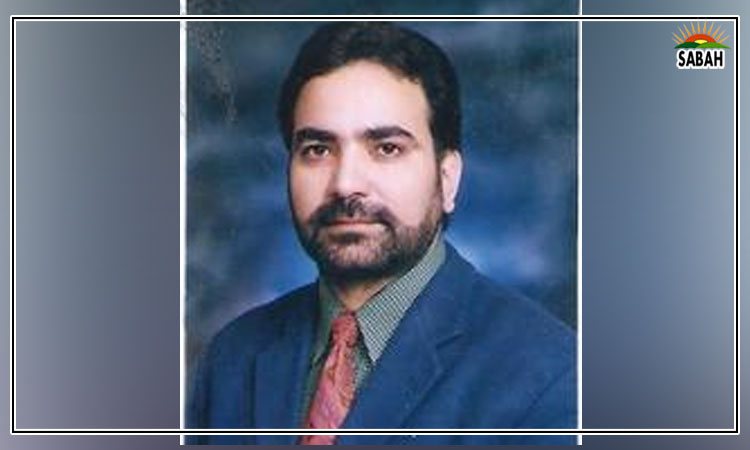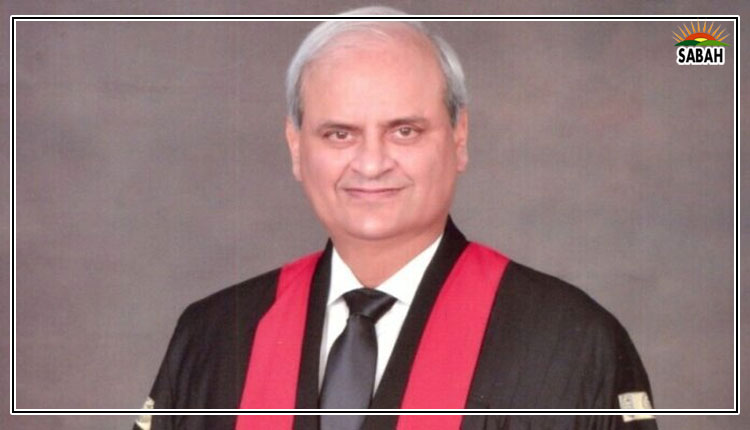CJ LHC Malik Shehzad Ahmed Khan says interference of the establishment in the matters of the judiciary will end soon
RAWALPINDI, June 14 (SABAH): Lahore High Court (LHC) Chief Justice Malik Shehzad Ahmed Khan on Friday said he believes that interference of the establishment in the matters of the judiciary will end soon.
“Interference in the judiciary will have to be fought with faith that it will come to an end,” said the LHC Chief Justice Malik Shehzad Ahmed Khan while addressing the opening ceremony of the judicial complex e-courts in Rawalpindi.
Justice Malik Shehzad Ahmed Khan said there was an issue of establishment’s interference in the judiciary’s matters, adding that they receive letters claiming involvement in the judicial affairs.
“The establishment’s interference in judiciary will end and my experience [tells me] that it will come to an end,” said the judge, assuring that these difficulties will end if there is fear of God.
The LHC chief justice also said that he was happy that the judiciary was “fulfilling its responsibilities without any fear or greed”.
Speaking about the issues in the judiciary, the LHC CJ said delay in verdicts of cases is the biggest problem. “Three generations [of a family] wait for verdicts and it [sometimes] take 30 years,” he lamented.
Justice Malik Shehzad Ahmed Khan maintained that the cases are delayed because of the unavailability of witnesses, adding that he has consulted with high court judges to solve the issues. He said that the people living overseas had trouble appearing before the court and their properties in Pakistan are stolen.
The LHC chief justice said legal issues were also reviewed in the context of e-courts, adding that those absconders will not be allowed to appear via video link.
“Pakistanis living abroad will be able to get video link facility by coming to the embassy,” he added. The LHC CJ also blamed the lawyers as the main reason for delay in cases.
Justice Malik Shahzad Ahmad said he has received complaints and letters — many verbally — of interference in judicial matters by “institutions”. He said, “It is this country’s misfortune that this started from the Moulvi Tamizuddin case and is still ongoing.
“We receive letters, complaints and oral complaints that interference is being done in the judiciary in which a few institutions — naming them is not appropriate — are involved,” he added.
The LHC chief justice said he was glad that the judiciary was “fulfilling its responsibilities without any fear or greed”.
Referring to recent claims of a session’s judge of a Sargodha Anti-Terrorism Court (ATC) about interference in judicial matters by an intelligence agency, Justice Malik Shehzad Ahmed Khan said the judge in his complaint had stated he was not afraid of any of the incidents he allegedly faced. “I am ready for any sacrifice that I might have to make but I would not do injustice to anyone,” Justice Malik Shehzad Ahmed Khan quoted the ATC judge as saying.
The chief justice went on to say: “We have received other such complaints as well. Many complaints are not in written [form] as they say evidence would be demanded, which would be difficult to provide.”
Addressing his subordinate judges, he said, “Temporary worries do come but you have to face them eye to eye and not be a target of any of their blackmailing. Do not be hesitant to make any kind of sacrifice.
Praising former chief justice of Pakistan justice Iftikhar Mohammad Chaudhry for being the “only judge to initiate efforts against a military dictator”, he recalled that the lawyers’ movement back then resulted in his restoration as a judge.
Justice Ahmad highlighted that Pakistan was currently “going through one of the longest periods of a civil government”, adding that the 2007 lawyers’ movement “closed the doors for martial law forever”.
“To get rid of the establishment’s interference, we have to face it with bravery, courage and without any fear, and with the belief that this interference, God-willing, will end soon,” he said.
The judge urged lawmakers to play their role in improving the country, noting that positions were a temporary thing.












